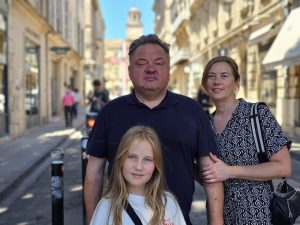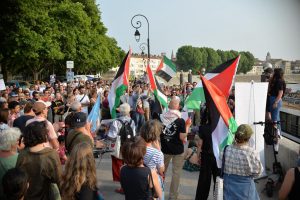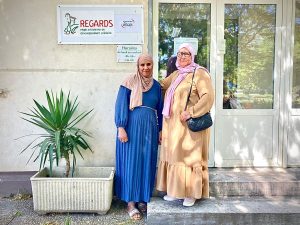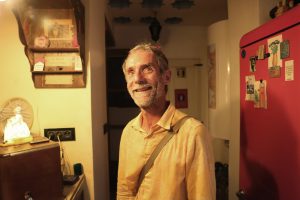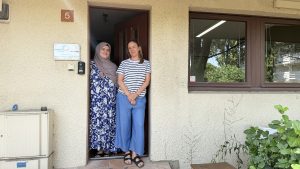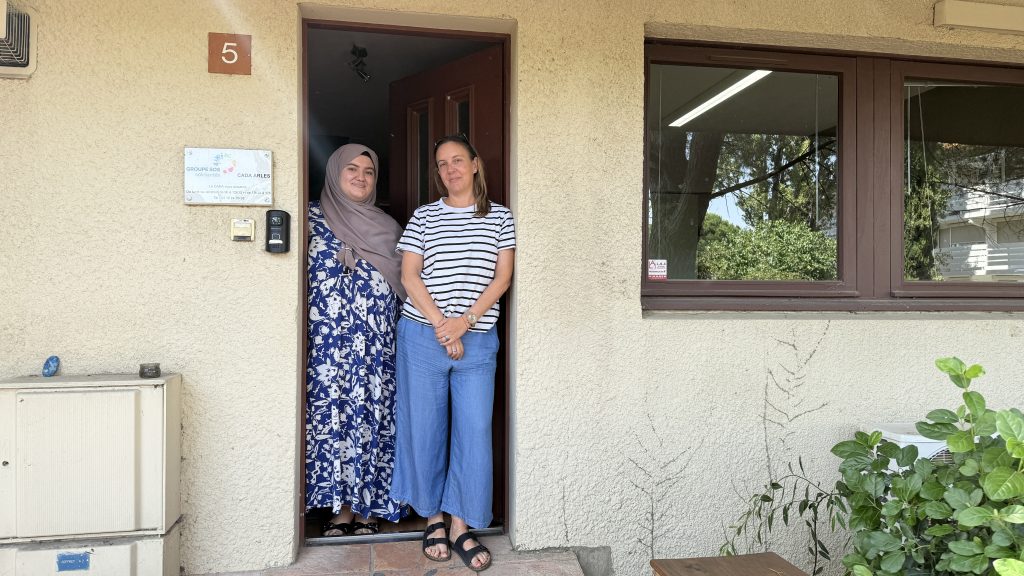
Sarah Pellas-Gottleib, the assistant director of the Centre d'accueil pour demandeurs d'asile, and Nasria Bourafa, a social worker for the center, stand outside the office they had to vacate because of budget cuts. Photo by Morgan Dunn.
Text by Morgan Dunn
Escaping a rough life in Africa, Olivia came to France pregnant alongside her two children, seeking asylum. At the beginning of her journey in France, she was homeless and was even robbed of the little money she had.
Left with nothing, Olivia (who asked that only her first name be used for safety concerns) had no choice but to dial 115: an emergency call that saved her. Now Olivia has made it to a secure home in Arles, with three children in school.
Although every story is different, Olivia’s demonstrates the complex struggles asylum seekers in France have to face before finding their way forward, even as budget cuts undermine the help they need.
In 2024, the French Ministry of Interior registered 157,947 individuals as asylum applicants. That same year, 64% of those eligible were granted housing, according to the Asylum Information Database, citing government statistics.
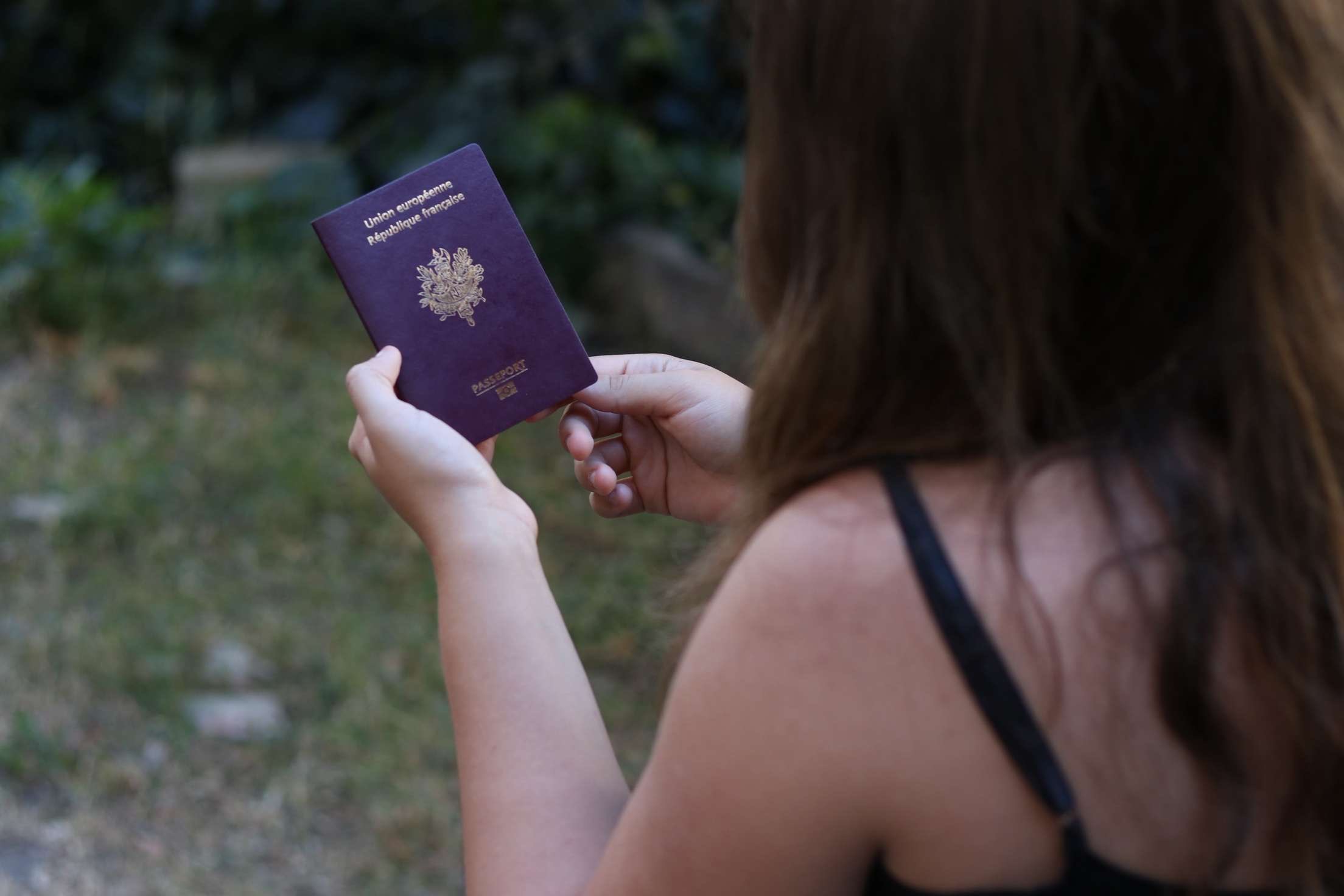
Centre d’Accueil pour Demandeurs d’Asile is an organization in France that provides housing for asylum seekers through allocated government money. The assistant director, Sarah Pellas-Gottleib, said funding cuts to the center have required it to minimize its office space. It still maintains the facilities to house 86 families in Arles.
Olivia is currently one of those housed by the center who is trying to adjust to French life after leaving her dangerous life in Africa.
A long journey
Her journey started in her native Benin, then continued in Ethiopia, where she lived for two years before making the journey to France. There, she started in Paris, then went to Marseille, then to Gap, before finally making it to Arles, seeking stable shelter.
She said coming to France was difficult, not due to the physical journey itself, but because she had to leave everything behind.
“I had to make a choice between [possessions] and staying in a place that was dangerous, and that was insecure for us, and so I did the best for my family, [and] for my children,” she said.
When Olivia dialed 115, she was directed to an emergency housing hotline run by the French Immigration system.
The hotline set her up with a temporary housing agency, which eventually put her in touch with the center, which in turn, brought her to Arles.
When she arrived in Arles, the center gave her an apartment and enough food and resources for two weeks. She had no personal resources, so the center’s staff wrote to the Centre communal d’action sociale, who provided her an extra 96 euros a week to live on. The center’s staff also immediately signed her kids up for school.
All of this happened before she was able to get her asylum seeker card. After receiving that, she got more funding, which gave her access to a cell phone, allowing her to contact other nonprofit organizations that provide food, clothing and other necessities.
She is now waiting for her asylum seeker status request to go through and does not know how long she will have to keep waiting. She is not yet permitted to get a job but has been studying sociology and hopes to one day do work related to it.
Because she is in this waiting period, she spends her days attending workshops and events hosted by different organizations. In addition to sociology courses, she recently took one class in self-defense class, a second aimed at building up self-confidence by recognizing capacities, and a third in speaking about personal experiences.
Budget cuts
With the recent budget cuts, the center’s staff has to work harder because the number of asylum seekers they serve is just as large, Pellas-Gottleib said.
“They would risk anything to come to France in the hope of finding a better life,” Pellas-Gottleib said.
Organizations like the center tend to prioritize women and children, leaving many young men with nowhere to go, according to Marc Normand, a coordinator for the Jesuit Refugee Alliance. The alliance is a nonprofit, nongovernmental organization that sets up housing and aid for asylum seekers who were denied help from the government.
Right now the alliance is housing Qasimi, who left behind war in Afghanistan to seek a new life in France, with a volunteer host family. (Qasimi asked to have only his last name shared because of the sensitivity of his situation.)
The alliance is staffed completely by volunteers and receives no funding. The host family Qasmi is staying with is providing him help completely out of pocket.
He said his journey was difficult and it was hard leaving his home, but his approach to this transition to France is to fully immerse himself in French culture. He has learned a lot of French, and says his host family has done a good job at integrating him into the cultural norms in France.
France law requires those seeking citizenship to speak a sufficient amount of French, but in April 2024, the French language training program was discontinued due to budget cuts.
While the stories of Olivia and Qasimi display what it may look like for an asylum seeker coming to France, they are not the only possibilities. Both the center’s Pellas-Gottleib and the alliance’s Normand said every situation is case by case.
Despite the difficulties and budget cuts, both organizations remain determined to help asylum seekers in France. Qasimi said that, in his experience, the more effort one puts into learning the French language and culture, the more the French will return the favor.
“They will help you,” he said. “They will take your hand and they will lift you up.
Katie Thornton, Emilie Raulet and Monica Ronco served as interpreters for this story.
